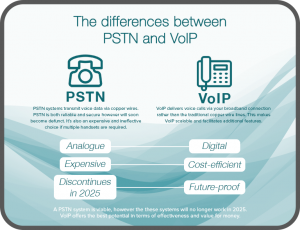Having a reliable phone system is a crucial element of a lawyer’s office in order to guarantee the effective running of day-to-day business. Whether you’re negotiating with clients, scheduling meetings or liaising with fellow colleagues, a dependable telephone connection cannot be compromised.
If you’ve already begun the search for a new phone system or started to suss out upgrade options, you’ll be aware that a variety of solutions exist. As each harbours its own unique benefits and drawbacks, it’s vital you carry out thorough research. This guide should help you to make an educated decision, resulting in the procurement of a system which best meets the needs of your legal firm.
Should you choose PSTN for your office?
Many businesses, including law firms, still use a traditional PSTN (Public Switched telephone Network) set up – often referred to as a landline. PSTN systems transmit voice data via copper wires – the same infrastructure used to deliver ADSL and FTTC (fibre-to-the-cabinet) broadband internet.
Despite the rise of cloud-based phone solutions, PSTN connections enjoy the advantage of not being reliant on a data connection. This means you are unlikely to be at risk of any downtime in service if your internet connection goes offline.
The PSTN switch-off
While PSTN phone systems are still a common solution, the main consideration at this point should be longevity.
Openreach has announced that it plans to shutter support for PSTN and ISDN services by 2025. Whilst it’s still plausible to install a PSTN phone system, in a few years the infrastructure facilitating these services will be obsolete. This will mean having to source another solution: a time-consuming process that can be problematic for anyone in the legal industry as there is a requirement to be consistently contactable.
Another significant drawback of PSTN technology is the need to build in the infrastructure necessary to support it: if a new phone line is needed, an engineer will need to install the connection to the exchange. This will be repeated each time capacity needs to be added. In an office with several lawyers working independently, all of whom require individual access to a phone, this can equate to increased lead times and costs.

The rise of VoIP phone systems
If you want to future proof your law office’s phone system, VoIP (Voice-over Internet Protocol) is undoubtedly the superior option. VoIP delivers voice calls via your broadband connection rather than the traditional copper wire lines. Businesses are making the switch to VoIP in increasing numbers, ahead of the ISDN/PSTN switch off – should you be doing the same?
Benefits of VoIP
Call transferring
A commonly utilised feature of VoIP, call transferring allows a call to be instantly redirected to the appropriate person, based on the identity of the incoming caller. In a legal setting, this will be of particular benefit if a receptionist routinely answers incoming calls or multiple associates are dealing with a mutual client.
Portability
Whatever your role within a law firm, the chances are you will need to work remotely at least on occasion. A VoIP solution allows connected handsets to be used on any network, which means you can be contacted by phone wherever you have internet access.
Quality
Whilst a cheaper VoIP solution may not provide the call quality needed for use in a lawyer’s office, investing in a correctly configured secure and managed product will guarantee HD call quality with a level of clarity better than a PSTN system.
Cost
Even before the end of traditional PSTN and ISDN services was announced, many businesses had opted for a VoIP solution in order to reduce their telephony costs. Eschewing the need for a separate phone contract, VoIP not only does away with the additional standing charge, it also eliminates any per call connection fees, maintenance charges and the need to incur installation costs if additional lines are required.

VoIP limitations
Reliance on a persistent internet connection
The main selling point of a VoIP solution doubles as its biggest limitation: the need for broadband internet. In the event of any connectivity issues, your business will be unable to make or receive calls, which will impact on your capacity to fulfil day-to-day client and administrative obligations.
Furthermore, a poor internet connection can impact on the quality of your phone conversations. In addition to the potential for making you and your colleagues appear unprofessional, it could result in information being mis-communicated, misinterpreted or missed entirely – not great when your work is centred around delivering accurate and clear information. Opting for a reliable ISP which guarantees a minimum downtime will reduce the chances of this happening.
Emergency call functioning
Whilst it is possible to ring the emergency services over a VoIP line, it could be problematic for them to track and trace the correct geographical origin of a call if a satellite office uses the main office number (CLI) to identify themselves on outgoing calls. This is worth bearing in mind when configuring the system for the first time.
VoIP or PSTN: which phone system is better in a lawyer’s office?
Ultimately, VoIP is very much the wave of the future and offers the best potential in terms of effectiveness and value for money.
Whilst upgrading your existing PSTN system is viable, it’s recommended that you avoid investing in a whole new landline solution ahead of the upcoming switch off.

